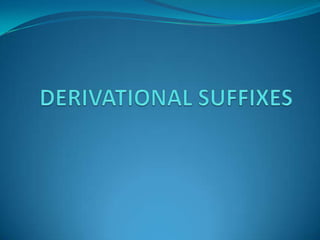
Derivational suffixes
- 2. With the adding of derivational suffixes, the new word has a new meaning and is usually a different word class. But the new meaning is related to the old meaning which it is "derived" from the old meaning.
- 3. EXAMPLES explore (v) + -ation = exploration (n) accident (n) + -al = accidental (adj) helpful (adj) + -ly = helpfully (adv) Terror (n) + -ize = terrorize (v)
- 4. However, in some cases like the adding of prefixes, the word class of a new word formed, do not change. And the new word form is usually gives negative meaning. EXAMPLE - place (v) + dis- = displace(v) - credible (adj) + in- = incredible (adj) - legible (adj) + il- = illegible (adj)
- 5. SPELLING RULES IN FORMING DERIVATIONAL WORDS
- 6. Rule I. Final "e" followed by a Vowel. Final “e” of a word is dropped on taking a suffix beginning with a vowel EXAMPLE: blame + able = blamable guide + ance = guidance Come + ing = coming force + ible = forcible obscure + ity = obscurity
- 7. EXCEPTION 1 Words ending in “ge” or “ce” usually retain the “e” before a suffix beginning with “a” or “o” for the reason that “c” and “g” would have the hard sound if the “e” were dropped Peace + able = peaceable Change + able = changeable Courage + ous = courageous.
- 8. EXCEPTION 2 Words ending in “oe” retain the “e” to preserve the sound of the root Shoe + ing = shoeing hoe + ing = hoeing The “e” is retained in a few words to prevent their being confounded with similar words Singe + ing = singeing (to prevent its being confounded with singing).
- 9. Rule II. Final "e" followed by a Consonant. Final “e” of a word is retained on taking a suffix beginning with a consonant Pale + ness = paleness large + ly = largely EXCEPTION 1 When the final “e” is preceded by a vowel, it is sometimes omitted due + ly = duly true + ly = truly whole + ly =wholly
- 10. EXCEPTION 2. A few words ending in “e” drop the “e” before a suffix beginning with a consonant Judge + ment = judgment lodge + ment = lodgment abridge + ment = abridgment
- 11. Rule III: Final "y" preceded by a Consonant Final “y” of a primitive word, when preceded by a consonant, is generally into “I” on the addition of a suffix. EXCEPTION 1 Before “ing” or “ish”, the final “y” is retained to prevent the doubling of the “I” pity + ing = pitying
- 12. EXCEPTION 2 Words ending in “ie” and dropping the “e”, by Rule I. change the “I” into “y” to prevent the doubling of the “I” die +ing = dying lie + ing = lying. EXCEPTION 3 Final “y” is sometimes changed into “e” duty + ous = duteous beauty + ous = beauteous
- 13. Rule IV: Final "y" preceded by a Vowel Final “y” of a primitive word, when preceded by a vowel, should not be changed into an “I” before a suffix joy + less = joyless
- 14. Rule V: Doubling Monosyllables and other words accented on the last syllable, when they end with a single consonant, preceded by a single vowel, or by a vowel after “qu”, double their final letter before a suffix beginning with a vowel. rob + ed = robbed fop + ish = foppish squat + er = squatter prefer' +ing = prefer'ring
- 15. EXCEPTIONS “X” final, being equivalent to “ks”, is never doubled; and when the derivative does not retain the accent of the root, the final consonant is not always doubled prefer' + ence = preference
- 16. Rule VI: No Doubling A final consonant, when it is not preceded by a single vowel, or when the accent is not on the last syllable, should remain single before an additional syllable toil + ing = toiling cheat + ed = cheated murmur+ ing = murmuring.
